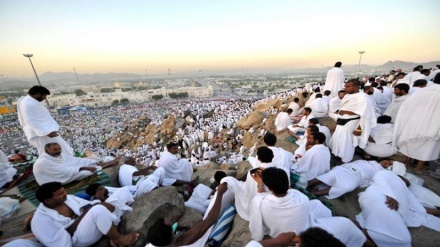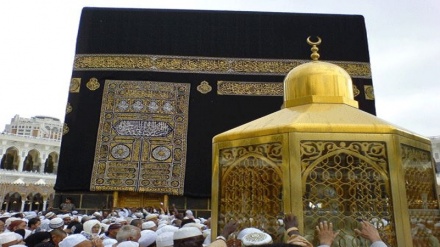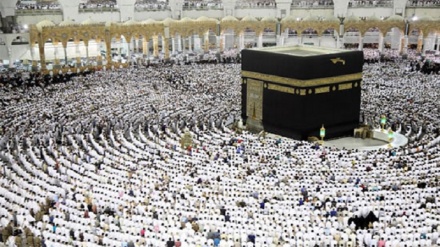The Abrahamic Hajj (3)
Welcome to the third episode of the Abrahamic Hajj.
Yesterday we spoke about the exalted position of the Sacred Ka’ba, the Symbolic House of the Omnipresent but Unseen Creator, and today we will focus on the merits of the “Zuyouf ar-Rahman” or Guests of the All-Merciful Lord as pilgrims are called.
In the holy Qur’an God Almighty has enumerated His great blessings on humanity including the nations of the past, such as the Israelites who despite their initial belief in monotheism, rebelled against Divine Authority, persecuted and killed several prophets, and for their ingratitude were afflicted with various punishments.
In ayah 40 of Surah al-Baqara, the All-Merciful Lord says: "remember My blessing which I bestowed upon you,"
Also in ayah 125 of the same Surah, God refers to the blessings of the Sacred Ka’ba, and says: "And [remember] when We made the House a place of reward for mankind and a sanctuary,"
As a matter of fact, the blessings of God are numerous and persist throughout the years for those striving to avail them, such as in the month of Ramadhan, in which those who fast and partake of the Iftar or breaking of the day’s fast, are called “Zuyouf ar-Rahman” or the “Guests of God.
It is interesting to note that one of the regularly recited supplications in the blessed month of Ramadhan, is the prayer to God Almighty for granting the opportunity to perform the Hajj pilgrimage as well as pilgrimage to the shrine of Prophet Mohammad (blessings of God upon him and his progeny). It reads:
“O Allah, favour me with pilgrimage to Your sacred House, during this and every year that You keep me alive in circumstances of ease, welfare and ample means; and do not deprive me from being present in those noble places and sacred shrines; and (do not deny me) the ziyarah of the tomb of Your Prophet, may Your blessings be upon him and his progeny.”
Prominent contemporary exegete of the holy Qur’an, Ayatollah Abdullah Javadi-Amoli, says the spiritual atmosphere of Ramadhan and that of the holy land, Hijaz, is such that the faithful, whether the hosts or the guests, strive to attain and retain the proximity to Allah. Hence both the hosts and the guests are the “Zuyouf ar-Rahman” or the Guests of God Almighty.
"Rahman" or the All-Merciful is a blessed word which repeatedly occurs in the Holy Qur’an. It has been mentioned 113 times at the beginning of each Surah as part of the famous phrase “Bismillah-ir-Rahman-nir-Raheem” and 56 times in the various ayahs of the holy Qur’an. This Exalted Atribute of Almighty Allah refers to Divine Mercy which can be compared to rainfall which benefits everyone, whether believers or unbelievers. As we read in ayah 75 of Surah Forqan:
"Those shall be rewarded with sublime abodes for their patience, and they shall be met there with greetings and ‘Peace,"
Thus, in view of these facts, the Hajj season is among the best periods of the year to attain Divine Mercy, although God’s Mercy is everywhere and on every day, as ayah 4 of Surah Hadeed says: “and He is with you wherever you may be.”
According to this ayah, Allah is present everywhere which means there is no specific place for God the Omnipresent Who is far glorious to have place, shape or form and cannot be perceived by the eye. He is All-Observant of our words and deeds and is also well aware of the thoughts that flash across our mind. Thus, during the Hajj, the pilgrim strives to attain the proximity of the One and Only Allah, the Creator of the universe. This makes the Hajj pilgrim dignified in society and meritorious in the sight of God, as if he had just been born without any sins. However, as is clear by a narration from the Prophet’s 6th Infallible Heir, Imam Ja’far Sadeq (AS), a sinner drifts away from the mercy of God.
Undoubtedly, such honored Guests of God should be respected by those who call themselves Custodians of the Ka’ba, on whom it is obligatory to ensure the peace, security, and comfort of the Hajj pilgrims who have come to Mecca in response to the call of Prophet Abraham to perform the Hajj. If those ruling Hijaz and the holy cities of Mecca and Medina do not provide security to the pilgrims and do not take proper care of the holy sites, then they are not eligible to rule, and should be removed. In view of this, can the Aal-e Saud regime which forcibly and through bloodshed seized Hijaz and the holy cities in 1925, be considered the legitimate rulers of the Land of Revelation! The answer is a big No, since the Saudis have a bleak, black and bloody record of desecrating and destroying the sanctities of Islam, and killing of pilgrims. In 1987, the Saudi regime massacred over 400, mostly Iranian pilgrims in Mecca, for protesting against the enemies of Islam, such as the US and the Zionist regime. The latest incident of the massacre of “Zuyouf ar-Rahman” or the “Guests of God” was in 2015 when the Saudi Heir Apparent, Mohamed bin Salman (MBS), riding a motorcade with scores of his followers, ordered the closure of several paths leading to the ritualistic stoning of the devils, resulting in the tragic stampede and the death of several thousand Guests of God in the holy place of Mena, including some seven hundred Iranian male and female pilgrims.
A famous statement from Prophet Mohammad (blessings of God upon him and his progeny) says: All those who believe in God and the Day of Resurrection, must honour the guests.
This means, pilgrims to the holy land who are rightly called “Zuyouf ar-Rahman” or the Guests of God, are more worthy of respect and honour by those exercising political and administrative control over the holy cities of Mecca and Medina.
In this regard, Leader of the Islamic Revolution Ayatollah Seyyed Ali Khamenei, in his meeting with Iran’s Hajj officials before their departure for the pilgrimage, said: Those who are in charge of the sites where the Hajj is performed, that is Mecca, Medina, and the adjacent sites, such as the Saudi authorities, shoulder a heavy responsibility, and it is part of their duty to provide security, peace, comfort and respect to the pilgrims, who are the “Zuyouf ar-Rahman” or the Guests of God.
Another important point is the behaviour of pilgrims. They are monotheists and symbols of the dignity and power of Islam. They should thus behave in the proper Islamic manner in order to serve as example to others. They should portray the true Islamic image of faith, patience, piety, unity, and brotherhood. This is how Hajj becomes a huge congress and impacts the Ummah and the rest of the world.
FK/AS/SS


